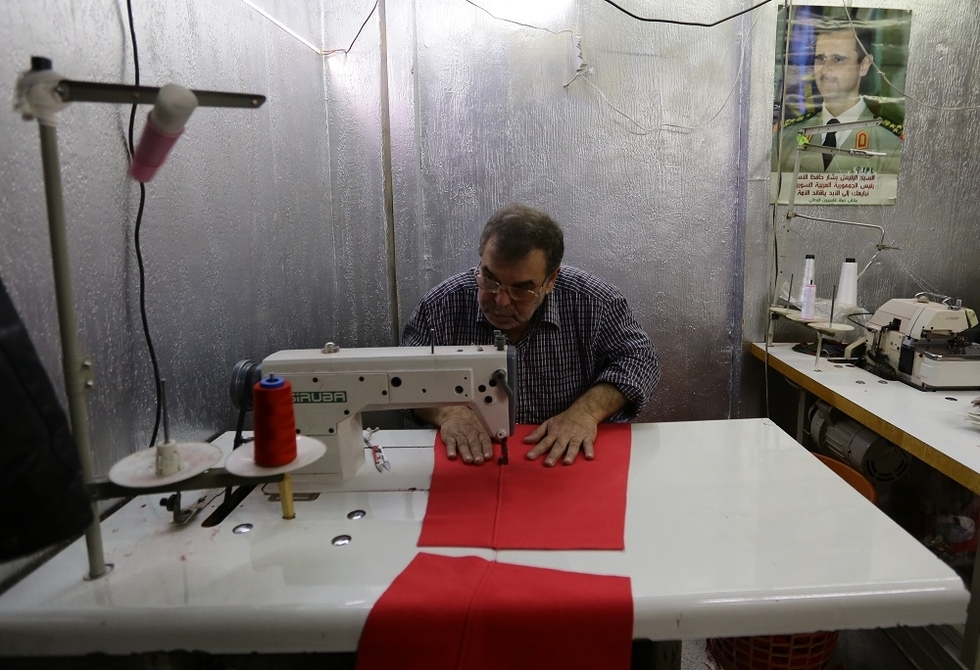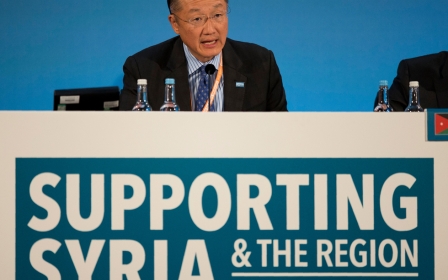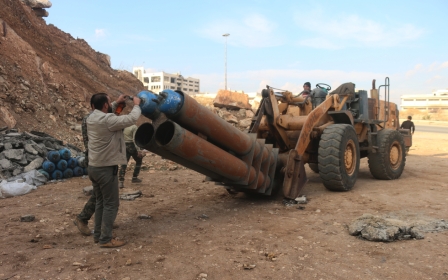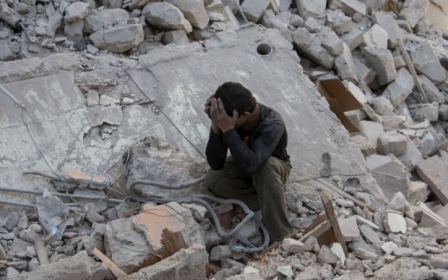ANALYSIS: Why even $10bn can't get Syrians back to work

LONDON – Surpassing all expectations, the donor community gathered in London to promised $10bn for Syrians, exceeding the $9bn target set by the UN for 2015.
But while generosity was hailed, Syrians and aid groups warn that huge hurdles remain.
Much has been made about the need to stop the five-year conflict, which has killed more than 260,000 people and displaced millions more.
The Red Cross and many Syrian groups at the conference said they feared aid could at best be a sticking plaster while the war rages.
“The bombing has to stop. Safe corridors and direct access to the besieged areas should be assured,” Ruham Hawash, who represented Germany-based NGO Citizens of Syria at the London conference, told MEE.
Yet, there are other less obvious hurdles that threaten to undermine the highly touted new donor approach of having more money directed to job-creation, which is needed to bolster livelihoods, education opportunities and, in the eyes of the donor community, give Syrians an excuse to stay in the region.
Donors say that the money will help get one million children back into school by next September, while creating more than a million new jobs for Syrians and locals living in Jordan, Lebanon and Turkey.
But the reality on the ground threatens to work against them.
The right to work in neighbouring countries has been lauded as a key achievement, with Turkey, Jordan and Lebanon all promising to free up their labour regulations, but their commitments risk sounding hollow.
Lebanon dragged its heels on the issue until the 11th hour.
“They said yes to jobs but are not talking about citizenship or residency and the legalisation of their status in Lebanon,” George Ghali of Lebanese NGO Act for Human Rights told MEE.
“Without this Syrian refugees will continue to be denied many human rights protections. Syrians in Lebanon are not guaranteed the free right of movement. What good is a job if you can’t make it to your place of work?
“While people are not summarily detained, the risk is ever-present. Things are so bad many Syrians are self-curfewing in informal camps to avoid police harassment.”
Lebanon has an official unemployment of about six percent, but youth unemployment is closer to 35 percent.
Lebanon imports a high number of foreign workers for low-grade jobs, but it has not opened up its labour market to Palestinian refugees, believed to number between 300,000 to 460,000, fearing that it would lead to citizenship and upset Lebanon’s fragile religious balance.
Moreover, Lebanon, a country of 4.5 million people, has said that the refugee crisis has cost it more than $20bn, a hole that is unlikely to be plugged by aid alone.
The situation is similarly uncertain in Jordan which has been failing its own population in employment terms for decades. Officially unemployment is at 13 percent but in practical terms it is much higher, especially among the youth, women and those living away from cities.
Authorities have told media that while they would happily create more jobs with international help, they would not do so at the expense of Jordanians.
"The highest priority has to be decent jobs for Jordanian citizens,” Lee Ryder, ILO Director-General, said at an Amman news conference with the labour minister, Nidal Katamine, in late January.
"Refugees' lives are frozen. They want to find a place in the labour market, but this cannot be at the expense of Jordanians. This cannot be a zero-sum game, it must be a win for all.”
Any jobs that are created are likely to be low-skilled. Under the highly complex current legal framework, Jordanians get first dibs on professional careers such as medicine, engineering and law. They are followed by Palestinians with Jordanian residency, meaning that Syrians will be at the back of this system.
"My fear is that these aid contributions will actually yield very little,” said Sara Elizabeth Williams, MEE’s Jordan-based contributor.
“I've spoken with a lot of Syrians who have gone to Europe or who are planning to go, and most cite the same drivers: the hope of residency, full participation in a thriving labour market, affordable universities for their children, professional jobs for them and their children, and eventually, citizenship.
"The aid pledges we have seen in London are well intentioned, but they will not deliver these things."
She said that for the better educated and skilled, who make up the bulk of those going to Europe, the injection of low-skilled, low-paid jobs was unlikely to stop them from travelling to Europe.
The situation looks rosiest in Turkey, which before the donor conference promised more work permits, but even here the challenges are great. Unemployment has risen to 10 percent, food prices soared by almost 12 percent last year and inflation has risen to 9.5 percent.
Many employers who currently hire Syrians, at lower wages, say they may be forced to fire due to increased costs including national insurance contributions.
The concern is mirrored in Jordan and Lebanon, where there are no guarantees that formal employment will allow Syrians to earn more than currently.
And as long as employment stays low, education will suffer. Many refugee children are being forced to work, because their parents cannot, or cannot earn enough when they do.
"I hear Syrians say so often that they are just treading water in Jordan,” Williams said.
“They are surviving, but to what end? For more educated Syrians who had professional jobs at home, this stasis is particularly painful.
"For people who worked to get to university and get professional jobs, and then worked to give their own children better opportunities, watching their kids fall further and further from those dreams is devastating."
New MEE newsletter: Jerusalem Dispatch
Sign up to get the latest insights and analysis on Israel-Palestine, alongside Turkey Unpacked and other MEE newsletters
Middle East Eye delivers independent and unrivalled coverage and analysis of the Middle East, North Africa and beyond. To learn more about republishing this content and the associated fees, please fill out this form. More about MEE can be found here.




